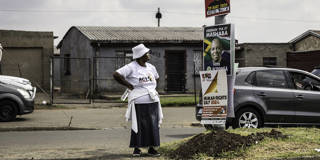Successive South African presidents from the African National Congress, the party that Nelson Mandela led to victory in 1994, have failed to curb rampant corruption and deliver public services. But even if the ANC loses its majority in the upcoming election, the country must continue taking a non-aligned approach to foreign policy.
PRETORIA – South Africa recently celebrated the 30th anniversary of its first democratic election, which brought to power Nobel Peace Prize laureate Nelson Mandela. Post-apartheid South Africa’s “founding father” and high priest of reconciliation, Mandela is revered globally as a secular saint. But today, he is increasingly accused of letting the wealthy white minority off the hook for 350 years of colonial and apartheid crimes, without securing adequate reparations for their overwhelmingly Black victims.
When South Africans head to the polls on May 29, Mandela’s legacy – and that of his political heirs – will face its greatest test yet. In the most consequential election since the country became a democracy, the African National Congress (ANC), which has ruled uninterrupted since Mandela led it to victory in 1994, may finally lose its monopoly on power.
Notwithstanding negative Western media coverage of post-apartheid South Africa, the country has made some impressive socioeconomic progress over the past three decades. Some 3.4 million housing units have been built, 90% of households are now electrified, 82% have piped water, and 18.8 million South Africans receive valuable social grants. (It is not all good news, of course: unemployment has risen to 32%, while 18.2 million people still live in extreme poverty.)

PRETORIA – South Africa recently celebrated the 30th anniversary of its first democratic election, which brought to power Nobel Peace Prize laureate Nelson Mandela. Post-apartheid South Africa’s “founding father” and high priest of reconciliation, Mandela is revered globally as a secular saint. But today, he is increasingly accused of letting the wealthy white minority off the hook for 350 years of colonial and apartheid crimes, without securing adequate reparations for their overwhelmingly Black victims.
When South Africans head to the polls on May 29, Mandela’s legacy – and that of his political heirs – will face its greatest test yet. In the most consequential election since the country became a democracy, the African National Congress (ANC), which has ruled uninterrupted since Mandela led it to victory in 1994, may finally lose its monopoly on power.
Notwithstanding negative Western media coverage of post-apartheid South Africa, the country has made some impressive socioeconomic progress over the past three decades. Some 3.4 million housing units have been built, 90% of households are now electrified, 82% have piped water, and 18.8 million South Africans receive valuable social grants. (It is not all good news, of course: unemployment has risen to 32%, while 18.2 million people still live in extreme poverty.)